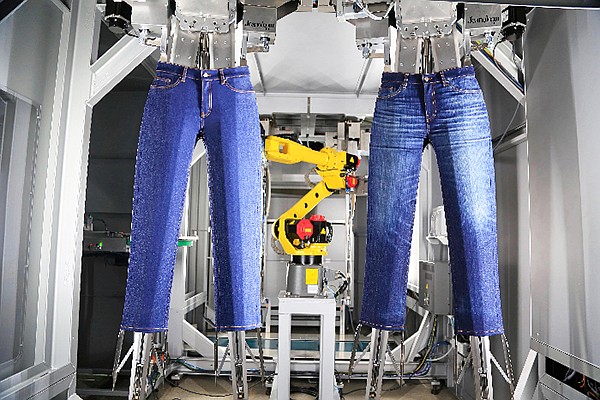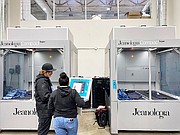DenimFWD’s Urban Factory is home to the first Handman in the U.S. The Handman by Jeanologia automates the laser-technology process and allows one operator to handle the whole production system. | Image by Jeanologia
MANUFACTURING
DenimFWD Opens ‘World’s First Urban Factory’
Denim Forward, Inc.,has unveiled its new plant, which it says is the world’s first Urban Factory, a finishing facility that implements revolutionary technologies that transform the textile-production model to an on-demand and fully sustainable process.
Using advanced manufacturing and transformational technologies, DenimFWD serves as an implementation company to create a more-sustainable denim industry that is also closer to the consumer. The Urban Factory is intended to be a digital-finishing center with a variety of solutions for on-demand production.
The plant is located in City of Industry, Calif., and helps bring a portion of the production process back to the United States. Chief Executive Officer Carlos Arias said the idea for the plant had been brewing for some time but that the timing was perfect now as retailers are beginning to change how they do business in a digital age and as consumers are changing how they shop for products.
DenimFWD has partnered with Jeanologia, a sustainable-textile-solutions provider, to integrate Jeanologia technologies at the Urban Factory. Jeanologia states that over 35 percent of the 5 billion pairs of jeans produced worldwide every year are made using Jeanologia technologies. Arias, who was previously CEO at Jeanologia, said the partnership between the two companies was a natural progression after working together for so long and being a customer three times. He said he understood that the technologies developed by Jeanologia had extraordinary potential to transform the industry.
Some of the Jeanologia technologies used at the Urban Factory include laser, G2 Ozone, e-Flow, SmartBox, ColorBox, EIM and H2Zero, the first water-treatment and recycling system that allows the reuse of water for up to 30 days as opposed to having every wash load taken to a treatment facility and then dumped. DenimFWD’s Urban Factory is able to produce up to 5,000 jeans and 4,000 T-shirts a day in a sustainable and efficient manner because of the integrated Jeanologia technologies. The company noted the benefits the Urban Factory brings to the textile industry: being eco-friendly, scalable, agile and digital, in addition to having a neutral cost and connecting designers, producers and consumers.
Through the shift to a more on-demand production process, the Urban Factory allows for a more-sustainable production process. Retailers need the option to hold inventory or postpone decisions until they can see what customers are shopping for to get the right products manufactured.
Arias used a denim wall as an example, stating that retailers need to project months in advance the styles customers will be shopping in that upcoming season. The Urban Factory allows retailers to fully stock their denim walls but also gives them the option to wait and see what is selling or trending better and, in turn, stock more of the products their customers want.
“When you don’t have to produce a massive amount of inventory that goes to waste, that, by itself, is important,” Arias said. “Just by the way our industry has placed more importance on sustainability, the newest technologies by themselves are top of the line, which help the Urban Factory have a significantly decreased footprint.”
Through the partnership with Jeanologia, the Urban Factory is the home for the first active Handman in the United States, which allows for automated laser technology to achieve fast and scalable production. The Handman is the latest laser technology from Jeanologia and features two lasers and a robot cabinet that automates the production process and allows for a faster and more-efficient process.
“A normal system has a person spinning the mannequin so the laser can burn it, but when it spins, the machine can’t be operated so a laser doesn’t hit an operator. With the Handman, the two lasers work together at the same time with no worry of hitting an operator. It’s extremely efficient with high automation that allows one operator to handle the whole production system.”
The Urban Factory also includes the latest technologies and products from Kornit Digital, a provider of digital-printing solutions. Included among the technologies are the Kornit Atlas MAX system as well as the Kornit Presto MAX system, the latest digital-printing system from Kornit and the first system that allows for white printing on dark-colored fabrics.
Arias explained that the first DenimFWD Urban Factory is just a preview of how it can impact the apparel industry. The goal for the company is to set up clear business models that help support its customers and become a complementary tool in its customers’ toolbox.
“What we’re creating is just a showcase of what’s possible in the U.S., and our hope is that this will be a model that will be replicated across the U.S. The capacities we have in an Urban Factory are small by design so the hope is we will be able to integrate solutions. We’re hoping this new model, which allows for sustainable product to be produced quickly and accurately, is going to be part of the future of the industry,” Arias said.























